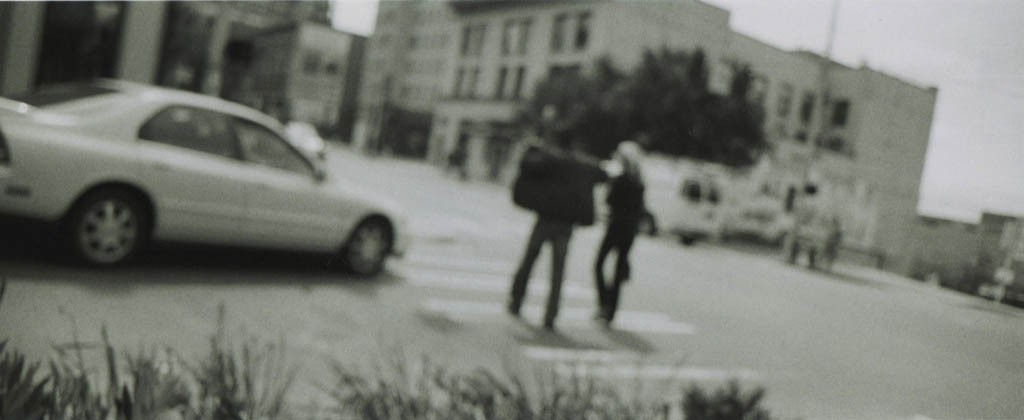
I pause at inbound Henderson, waiting for an indecisive runner. Why am I irritated? What is this rushing stress which bubbles inside of me on rare occasions, rearing its head like a stranger within? Something to work on.
“How’s it goin’,” I ask him as he pauses outside the front doors, staring into the middle distance. He decides to step aboard, a white fellow in middle age, thin and very cold, underdressed on this February night. His bowl-cut hairdo, parted in the middle, has the precision of a machine.
“Hey,” he asks. “Are you going towards Garfield?”
“Yeah, I am, yeah. Come on in. How you doin’ tonight?” Sometimes when I’m feeling less than stellar I’ll force myself to reach out further, asking about people’s days or complimenting their hats. You can use the people to bring you back up, get yourself out of your head.
“Oh, not so good,” he responds with a companionable sigh.
“I’m sorry to hear it. I appreciate the truthful answer, but I’m sorry to hear.”
“Well, it is what it is. We’re here.”
“And that’s a good thing. We’re alive, we’ve got our arms and legs,”
“Hey, there you go,”
“Lot to be thankful for.” Reminding myself as much as anything else.
“You got that right. Hey, you go up towards South Edmunds?”
We sort out the geography. I can tell he knows the terrain, but perhaps he hasn’t been out here for a while. He asks how my night is going, and I mention how much I love driving the 7. “It’s a favorite of mine.”
“How come?”
“It stays interesting out here. High energy, a lot going on, a lot of color,”
“Man, you’re positive.”
I laugh. He notes that he most recently saw me on the 49, and I mention how the two routes are interconnected at nighttime.
“Yeah,” he says, “my girlfriend and I, we were together about ten years,”
“Oh wow,”
“Yeah, she lived at the end of the 49 line, and I lived halfway down the 7 line.”
“Oh, excellent. That sounds like a pretty perfect setup.”
“Yeah, it was a perfect setup. She was great.”
He pauses.
“You know, she actually ended up killing herself.”
“Whoaaaa. Oh, no. Oh, no.” Suicide guts me on a level other violence doesn’t come close to.
“Yeah. Yeah.”
“Oh.” A heavy exhalation of air, the fitful attempt to release a burden.
“And it was totally unexpected, she was a positive person. She just …”
“Oh, my goodness.”
“She was just, sometimes she would get real down.”
“Was it like a clinical depression thing?”
“No, it was more of a bipolar type thing. She would have these moods, I don’t know. She had a head injury way back, and ever since that,”
“Okay,”
“Yeah, it affected her mood, affected everything,”
“Like a chemical imbalance,”
“Yeah. She did it on a Monday, man.” Silence. “She knew I was always busy running around on Mondays, and she chose a Monday when I was just payin’ some bills.”
“Oh, my goodness. That’s heavy. That’s, wow. Oh, man. Suicide gets to me pretty hard.” I mention a couple of incidents which took place when I was a child, and he tells me similar events happened amongst his acquaintances as well.
“So yeah, it just gets to me. And the thing is, it’s not really her, but that chemical imbalance, the injury,”
“Yeah, can’t blame her.”
“Can’t blame her. It feels strange to say it, that she’s gone.”
“When’d this happen?”
“Three months ago.”
“Oh, wow. Oh, man.” We drive in silence for a short bit. Here’s Othello Street. Here’s Frontenac, here’s Graham.
Me again: “but you know, I’m really glad you guys got to have those ten years together.”
“Oh yeah.”
“I mean, that’s huge. She’s always gonna be part of your character,”
“Ooh yeah,”
“And that’s good. Ten years, man. Longest relationship I ever had is three, so ten, my goodness, that’s just beautiful. I admire that. You know, somebody said once, ‘we’re gonna lose everything we love in this life,'”
“Yeah, yeah.” Nodding.
“‘And all we can do is just figure out how to enjoy it while we have it.’ That’s the great magic trick to getting through all this, this life.”
“Yeah. Yeah. Well, so, uh, hey, how’ve you been?”
We both laugh together, the pent-up sorrow belching out into something more familiar. We bring back the conversation, discussing such banalities as the number of round trips I have and how there’s hardly anyone out tonight. We cling to the ladder rungs of the ordinary, speaking and sharing our way out of the depths, rising slowly, such that we might feel all of life’s colors, and not just the thudding, aching blows.
Nathan Vass is an artist, filmmaker, photographer, and author by day, and a Metro bus driver by night, where his community-building work has been showcased on TED, NPR, The Seattle Times, KING 5 and landed him a spot on Seattle Magazine’s 2018 list of the 35 Most Influential People in Seattle. He has shown in over forty photography shows is also the director of nine films, six of which have shown at festivals, and one of which premiered at Henry Art Gallery. His book, The Lines That Make Us, is a Seattle bestseller and 2019 WA State Book Awards finalist.



